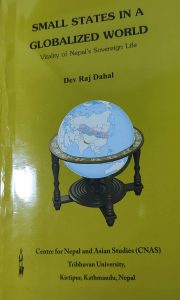Professor Dev Raj Dahal
Senior Political Scientist
Nepal
In his article “The adaptation of small states,” in The Study of Political Adaptation, James N. Roseau argues,”The more innovative and wide-ranging the leaders of small states can be in employing the knowledge-procurement strategy, the more they will facilitate their policies designed to redefine their self-environment relationships in the direction of greater autonomy” (1981: 122). If Nepali leaders cannot achieve this, the nation will continue to muddle around, like a rudderless ship, resembling many weak and fragile small states of the world. The Nepali state, akin to many European small states, is acutely engrossed in its historical narration which “teaches that without struggle-and the sense of insecurity that motivates it–there is decadence”Kaplan,2003:26).
Historical insights, not its amnesia or nihilism, help the current Nepali leaders to know how the nation has maintained its uninterrupted independence and survived in the ebbs and flows of the great game of regional and global powers and mobilized centripetal forces of society beyond the temptation of pre-political sub-national and transnational solidarity groups to weaken the state’s competence.

Globalization has made the life of Nepali people, corporations and nation-states interconnected. But it does not mean the emergence of a border less world.
Safe and secure borders are essential for the state to control crimes, smuggling, drug peddling, human trafficking, flow of unwanted elements and distribute the wealth of the nation to citizens.Insular life of a nation is autarkic like North Korea and Cuba. But technology and economy-driven globalization are opening borders,putting great pressure on the labor market, destroying jobs and tearing the social fabric of non-competitive states by fomenting centrifugal forces of society.
Nepal is not immune from these problems as many of its post-conflict issues linger beset by protracted political instability and irresolution of transitional justice. The nexus between business-politics-bureaucracy has monetized national political life. Globalization has turned Nepali parties into a catch-all type eroding their ideological boundaries, building leadership network and prompting them to exchange politics for money, position and influence amounting to the inversion of national perspective and interests. It has reduced the scale of volunteerism in politics making it high cost game. Worst still, the market-driven globalization, devoid of reasonable regulation, has set loose animal spirits that fostered creative destruction of Nepali society glued by non-market elements.
In short, the “finance sector has become a master, not servant to the real economy” (Pettifor, 2017: 5), such as agriculture and industries.In a flat world of globalization, digitized money flow has collapsed the geographical distance and contesting the social contract and social boundaries. It has increased the vulnerability of small economies to the larger and more powerful states controlling the commanding height of financial capital.
This is precisely the reason Nepal prefers regulating the border attuned to modern times and maintain the stability of its macroeconomics. Latvia and Estonia are seeking to delink from their larger neighbor Russia for economic and security reasons. The small Baltic States are successful in bringing the Western powers to negotiate with Russia and maintained collective autonomy in foreign policy.
Other small states of Europe have”outperformed their larger neighbors in policy flexibility and creativity (Hey, 2003: 4) and avoided the ongoing crisis of capitalism. With the exit from transitional politics,how Nepal is going to determine its place and stand in the world context(Adhikari, 2005:43) is a matter of vital importance. The greater the addiction of leaders to juvenile dementia, the lesser their concern for a higher national purpose.
In fact, the Nordic countries have emerged as “norm-entrepreneurs”in regional cooperation and international relations which helped to temper the rage of the realpolitik of great powers of the East and the West and acted as bridge-builder of the global order resembling the Asian formulation of Panchsheel to regulate the peaceful and noninterventionist conduct of inter-state relations. In the Middle East,Oatar and Oman successfully expanded small state diplomacy in the Gulf Cooperation Council and became global transport and commercial hubs. In the South Asian neighborhood, Bhutan has walled up its borders against neighbors defining its way of living under gross national happiness. Finland, like Nepal, secured its independence by sheer tact of balance, defiance, courage, force of arms and becoming members of regional and international organizations. The proliferation, survival and resilience of many small states while the collapse of many lumbering imperial Leviathans leaves a powerful lesson: a cohesive national vision and will attuned to the zeitgeist is important for foreign policy effectiveness. Common policies toward decolonization and national self-determination helped the growth of small states in the world and evolve mechanism for collective bargaining and attain collective self-reliance. Learning from the comparative history of other nations and their own can provide a useful guide to Nepali leaders. “The greater the disregard of history, the greater the delusions regarding the future”(Kaplan, 2002:39).
Globalization driven inequality, external penetration and sharp internal divisions have, however, caused the split and dissolution of many states while strong internal cohesion based on popular legitimacy has facilitated better external adaptation. One can cite many negative cases of dissolution and split of big and small states– the Soviet Union,Yugoslavia, Czechoslovakia, Sudan, Eritrea and East Pakistan. Even big state like Indonesia suffered a split. Still, those who are powerful and nationally interconnected hold the leverage of globalization and get most of the benefits due to the varieties of their resources at disposal while leaving others with limited resources and institutional inability the losers in its game. The small size of Nepal did not prevent the projection of its high-culture civilization, soft power of ideas and wisdom stemming from Shivaism, Vedas, Upanishads, Vedeha Janak and Buddhism across Asia in the past while being in active defense on hard power between the two gigantic neighbors. Nepal is a cradle of Hindu-Buddhist civilization and several yogic sects such as Machhindranath, Gorakhnath and Chandannath, the last one is spread even in India and Afghanistan.
Opening the nation’s cultural treasures to world cultures can initiate a new engagement for mutual learning. Like the Vatican, Nepal has used its soft power strategies to serve as pilgrimage sites for Hindus, Buddhists and countless sects from all over the world. World famous temples and monasteries represent impressive artistic and perfect engineering feats attractive for archeologists, cultural anthropologists and historians as well.
It holds the potential for world-class tourism and mountaineers as Nepal has many high mountains including Mt. Everest,the highest peak in the world. Culture helps to project its identity as a peaceful, tolerant nation. Nepali citizens continue to remain the provider of security for India, the UK, Brunei, Afghanistan, Iraq and Singapore and peacekeeping forces in the troubled zones of the world under the aegis of the United Nations. This suggests that harnessing all foreign policy tools to the central purpose of social cohesion and projection of national identity is an indispensable policy calculation for small states.

Nepal has always remained an interlocutor of small, landlocked,least developed and mountainous states. It has utilized these traits to avoid over exploitation of self and band together to increase its voice,participation, leverage and negotiation in conference diplomacy to meet common challenges. It helped to project independent image and status in the world. Strategic geography, history of national independence, syncretic culture, natural resource endowment, diverse topography,bio-diversity and demographic dividends offer it a great potential for sustainable progress and reduce the gap between the rich and the poor.Membership in the regional and global cooperation schemes from SAARC, BIMSTEC, BBIN, China, Pakistan, Afghanistan and Nepal (CPAN), the UN, Breton Woods’ institutions to World Trade Organization and many others helped it to practice the notion of sovereign equality or acquire equal status with other states and expanded international collaboration beyond hierarchical ordering of states. It helped to reduce dependence on only one state and domination of the weaker by the stronger ones.Functional collaboration meets each other’s needs and forms the basis of enlightened foreign policy. Nepal has, however, found no common ground to engage in a joint military drill of the BIMSTEC group organized by India and paraded that this region cannot be a substitute for SAARC. It,as a chairman of SAARC, showed interest to hold the summit rather than defect itself from regionalism to crawl and confine itself to a policy of bilateralism.
The identity, legitimacy and integration deficiencies in the SAARC divulge normative disconnection imposing barriers to functional regionalism and reap the distributive benefits from the potential of the economics of scale.
Nepal can somewhat be compared with two small states of the EU,Belgium and Luxembourg, who are very influential actors in shaping its policy.

Nepal continues to engage in high-profile conference diplomacy and internalize regional and global norms to fight the amorality of power polities of great powers. It helped to maintain consistency in its position in many international humanitarian issues and became a highly acceptable state in the comity of nations. The active foreign policy helps to manage the shift of geopolitics underlined by not only the importance of governments but also the efficacy of societal actors, such as private sectors, civil society, federations, unions and citizen activism.A major policy challenge for small states in regional and international cooperation is how to achieve the distribution of benefits in a judicious manner, prop up collective self-reliance and reap considerable profits from the need to foster interconnected cooperative security.
End text.
Concluded: Ed. Upadhyaya. N. P.
# Our own email address is: editor.telegraphnepal@gmail.com
